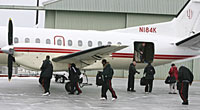NCAA News Archive - 2008
« back to 2008 | Back to NCAA News Archive Index
|
The NCAA News
After high fuel prices, decreased flight capacity and new trip-related fees resulted in higher-than-budgeted expenses for championships travel during the past fiscal year, all three NCAA divisions are studying how to respond to those conditions during 2008-09.
The Executive Committee Finance Committee approved a review of travel-related issues and requested that various governance bodies, including the Division I Championships/Sports Management Cabinet and the Divisions II and III Championships Committees, provide an initial report and any recommendations related to championships travel management to the Executive Committee and leadership in each division by October 30.
The NCAA national office staff has been monitoring a changing environment that resulted in a $7.2 million increase in championships travel expenses during the recently completed fiscal year, compared to 2006-07. Costs in Division I increased 31 percent last year and 58 percent over the last three years. In Division II the increase was almost 13 percent last year and 44 percent over the last three. Division III has seen increases of 7.5 percent over the last year and about 43 percent for the three-year period.
Indications are that the trends will continue, with a projected increase of $6 to $7 million in Division I travel expenses, assuming no changes to current travel, seeding and bracketing policies are made.
The increase largely is attributable to rising fuel costs, which impacts all modes of travel that the Association provides for student-athletes participating in the NCAA’s 88 championships, both on the ground and in the air.
Increased fuel prices especially are affecting air travel, as both commercial carriers and charter services raise fares in an effort to at least cover operational costs. However, airlines have been cautious about sharply increasing fares because of competitive pressures, and as a result have sought to recover a portion of operating expenses by imposing new fees on travelers.
Those fees include charges for checked luggage, which particularly impacts student-athletes traveling to championships competition because many must bring along equipment – ranging from uniforms and balls to sport-specific equipment for such events as football, skiing, or track and field.
This fall, commercial airlines are cutting the number of available flights to further reduce operational expenses. Projections are that available seats will be reduced by 10 percent during the last three months of this year, and further reductions are anticipated during 2009. As a result, teams will find it increasingly difficult to obtain enough seats on remaining flights to arrive at competition sites with minimal disruption of class attendance, and likely also will have far fewer nonstop or direct-flight options.
The NCAA typically has provided charter services in situations where air travel is appropriate and seats are limited on commercial airlines, but reduced capacity could dramatically increase the cost as well as availability of chartered flights. Projections indicate that charter costs could double or even triple during the next 18 months.
In response, the national office assembled an internal staff group to develop recommendations to alleviate some of the budget strain resulting from increased travel costs and to get ahead of anticipated problems created by diminished airline capacity.
NCAA championships officials acknowledge that adjustments may be necessary to manage some of these costs and the reduction in scheduled commercial flights, but the governance bodies are being urged to take appropriate steps to minimize the impact on student-athletes.
“We at the national office saw some of the problems that could occur during the upcoming championships season, and we want to discuss these issues with our various committees that administer our championships,” said Joni Comstock, NCAA senior vice president for championships. “We want collaborate to alleviate some of these concerns without diminishing the championship experience for our student-athletes.”

